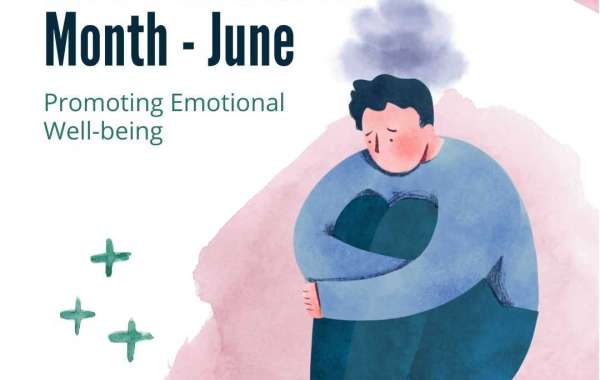It is important to remind everyone why mental health matters because June is Men's Mental Health Month. Our whole well-being and quality of life depend on our mental health, yet because it's frequently disregarded or stigmatised, many individuals suffer in silence. This is particularly true of men, who are typically viewed as being powerful, stoic, and emotionless. Unfortunately, because of this societal expectation, men are more likely than women to experience mental health problems. Men frequently struggle with mental health issues like anxiety, PTSD, depression and suicidal thoughts.
Men's Mental Health Month is a response to this. It's time to spread the word about the value of men's mental health and to eradicate the stigma associated with it. It's time to inspire guys to seek support and assistance for their issues with mental health.
Consequently, let's take a minute this month to recognise men's mental health and to express our support for the guys in our lives who may be experiencing difficulties. Let's encourage kids to be open about their feelings, to use good coping techniques, and, if necessary, to seek out counselling or other mental health options.
Common Mental Health Issues in Men
Among the most widespread mental health conditions affecting males worldwide include depression, anxiety, PTSD and suicide. Depression may take many different forms and have many different causes. When they are depressed, men may sometimes come off as irritated rather than visibly sorrowful. In contrast, anxiety can be even more difficult to identify, and men frequently write off their symptoms as being "stressed out." Men who have undergone severe mental or physical trauma, such as domestic abuse or sexual assault, may develop PTSD, a condition that is frequently linked to war and military conflict. The devastating result of ignored mental health concerns is suicide. For men under 45, it's one of the main causes of death in various nations.
Even though talking about mental health may still be taboo in some social groups, it is encouraging that more individuals are increasingly realizing the value of tackling mental health issues holistically. Men need to prioritize their emotional health and self-care just as much as their physical health, in particular. Destigmatizing mental health issues is crucial if men are to seek care more frequently and live happier lives.
Tips for Caring for Men's Mental Health
There are a few essential considerations when it comes to men's mental health care. Men need to be encouraged to express their feelings, first and foremost. Men are conditioned all too frequently to repress their emotions and present a tough front. But their mental health could be seriously harmed by this. Men can feel seen, listened, and supported if a judgment-free environment is provided where they can express their emotions.
It's crucial to teach good coping strategies and self-care routines in addition to fostering open communication. Exercise, mindfulness meditation and artistic pursuits are a few examples of this. Men can enhance their mental health and overall well-being by learning good stress and anxiety management techniques.
Male-Centered Approaches to Promoting Mental Health
Let's face it: Men are frequently forgotten about when it comes to advocating for mental health. There isn't much room for vulnerability or asking for help when guys are expected to be "tough" by society. It's time to alter that, though.
Promoting physical activity and exercise is one approach that has shown promise. It not only gives people a healthy way to express their feelings, but it also releases endorphins, which can lift one's spirits. A simple yet effective step towards improving mental health for men can be to encourage them to engage in physical activity on a daily basis.
It's not just about exercise, though. You cannot overlook how your job and career affect your mental health. Struggles with mental health may be exacerbated by long hours, high levels of stress, and challenging bosses. Employers must put a high priority on employee mental health and foster a positive work environment.
Finally, toxic masculinity has a serious negative effect on the mental health of men. It may be tremendously harmful to believe that guys shouldn't express emotion or ask for assistance when they need it. This stigma needs to be eliminated, and men should be encouraged to seek assistance when necessary.
Breaking Down Barriers to Mental Health Care for Men
Regardless of gender, everyone should have easy access to affordable mental health care. Sadly, because of the idea that men are meant to be tough and resistant to breakdowns, they may have more difficulty seeking treatment. Given that most men are reluctant to seek help for mental health issues, this is a big obstacle.
Additionally, racism and discrimination are pervasive in the field of mental healthcare. Due to mistrust or a history of bad experiences, men who belong to specific communities may feel awkward seeking mental health care. The expense of mental healthcare can be high and may not be covered by all insurance companies, so that's another obstacle for males seeking mental healthcare.
Understanding and addressing the disparities is crucial to removing the barriers to mental healthcare for males. Health providers need to be aware of the hurdles men encounter in seeking care as well as the specific requirements men have in terms of mental health. Men who are having trouble getting care may benefit from targeted advertising and education. Laws and policies can also improve accessibility for underprivileged people while addressing financial and insurance difficulties.
Conclusion
It's critical to keep in mind how vital men's mental health is. Men have been socialised to believe that they must be strong and that expressing their feelings indicates weakness, but nothing could be farther from the reality. Professionals have determined that stigma and prejudice can be the cause of mental illness, and if the person doesn't get the proper care, it can have serious consequences, sometimes even leading to suicide. To remove the stigma associated with men's mental health, therefore, is more crucial than ever.
It is essential to support and encourage males to seek assistance. Admitting that we need help requires a lot of guts. However, the advantages of getting support and assistance ultimately outweigh the hesitation and resistance. Through a dependable friend, a family member, a therapist or a support group are some methods to open up and seek support. You're not on this mental health journey alone, and asking for help can help you make progress.
Recognizing how far society has gone in promoting men's mental health is important. Nevertheless, there is always more to be done. In order to achieve this shared objective, let's stress the significance of men's mental health this Mental Health Month and urge one another to support and seek assistance.










